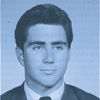Louis Bartholomew Casagrande – 50th Reunion Essay
Louis Bartholomew Casagrande
 215 Bryant Road
215 Bryant Road
Jaffrey, NH 3452
lbcasagrande@gmail.com
617-435-2033
Spouse(s): Julie Petty (1969)
Child(ren): Joseph (1973); Elizabeth (1977)
Grandchild(ren): Louis B. Casagrande(2003); Matteo M. Casagrande (2006); Roman J. Casagrande (2008)
Education: Master of International Relations, The American University, 1971; Ph.D. in Anthropology, 1979
Career: Science Museum of Minnesota, Curator of Anthropology(1975-1994), SVP (1987-1994); Boston Children’s Museum, President/CEO (1994-2009)
Avocations: Muskie and bass fishing, golf, environmental causes, children’s rights
College: Silliman
It was 1975. We were broke graduate students at the University of Minnesota when I took a part-time job as curator of anthropology at the Science Museum of Minnesota in St Paul. It was supposed to be a temporary situation. I stayed 20 years. I had fallen in love with the new philosophy of hands-on learning that was revolutionizing the museum world. In 1994 I became president/CEO of the Boston Children’s Museum, a beloved 105-year-old institution on the Boston waterfront.
I never intended to become a museum guy when I entered Yale. But the profession has fit me like a glove. And as I think back on my experiences in New Haven, I am remembering the exceptional human beings that sent me in this direction.
First, there was Lewis Gould, a 20-something graduate student, who led the intensive American History seminar that defined my freshman year. Eight of us met in his suite at Silliman twice a week for six or more hours. History boot camp. Gould demanded that we become scholars, that we cultivate the proper reverence for documents, archives and collections. For me, he was Yale personified. (I can still see him striding through the courtyard like an English don, engrossed in a book, oblivious to our touch football game.) History— then maybe law school—seemed the path I was on.
Then Margaret Mead showed up from the American Museum of Natural History to teach her weekly Intro to Anthropology. She filled the Law School auditorium, inflated grades for the entire class, and mesmerized us with her sense of the whole world as her laboratory. “Maggie” was a family friend, my father being an anthropologist and colleague. I had never really thought about following my father. But Margaret Mead reminded me how much I enjoyed being the son of an anthropologist, dipping sheep on the Navajo reservation, traversing the Ecuadorian rain forest.
About the same time I came under the spell (as many of us did) of Herb Cahoon at Dwight Hall. He demanded activism, getting involved in the lives of struggling families just beyond Yale’s walls. I signed up for the Big Brother program and befriended four Puerto Rican boys. That summer of 1967 Herb got me money to stay in New Haven to tutor older boys deemed delinquent by the courts. I vividly remember how lonely I was, staying in a rooming house, experiencing culture shock on Hill Ave.
It is hard to imagine where else I could have been so immersed in both scholarship and service, where else I could have found out so clearly and convincingly who I was and what I cared about. When I read about what Yalies are doing today, when I hear their voices on NPR, I am unabashedly proud, if not envious. Maybe at our 50th reunion we can add new fire to old bellies.
If the above is blank, no 50th reunion essay was submitted.
